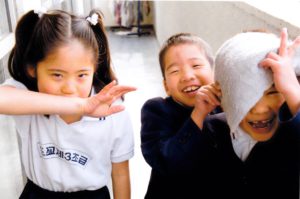Korean schools have built a trusting relationship with the Democratic People’s Republic of Korea (DPRK hereafter) because DPRK has continued to support the schools from the beginning. The Korean school students also go to DPRK on their high school senior trip. On the contrary, the relationship between Korean schools and the Republic of Korea (ROK hereafter) is not as strong, but civic exchanges have been happening in recent years.
 The Korean language schools were established immediately after liberation in 1945 and gradually developed into regular schools. In the early years, Koreans in Japan ran autonomous schools without any support or protection from their homeland because there was no government established in the Korean Peninsula at the time.
The Korean language schools were established immediately after liberation in 1945 and gradually developed into regular schools. In the early years, Koreans in Japan ran autonomous schools without any support or protection from their homeland because there was no government established in the Korean Peninsula at the time.
Meanwhile, the tension was escalating in the Korean Peninsula and the two states were eventually established in 1948 (ROK on August 15 and DPRK on September 9), and the League of Korean Residents in Japan (“Choryon” in Korean), the governing body of Korean schools, expressed its support for the socialist DPRK. Fearing that the Choryon and the Korean schools were hotbeds for communist indoctrination the GHQ (U.S. military government) and the Japanese government ordered Choryon be dissolved and the Korean schools to close in 1949.
In 1955, a new Zainichi Korean organization, known as the General Association of Korean Residents in Japan (“Chongryon” in Korean) in support of DPRK, was founded. Under the leadership of Chongryon, Korean education was quickly institutionalized and became the foundation of today’s Korean schools. For decades, the DPRK government was the sole political entity that showed an interest in developing Korean education in Japan and provided various forms of invaluable support.
In particular, in 1957 just four years after the armistice was signed while the DPRK government was in the midst of financial difficulty it sent 2-billion yen to support the Korean schools. This support meant more than just money. This strong tie with the homeland also helped Koreans in Japan emotionally as they struggled to protect their schools in the face of discrimination and suppression. Those first generation Koreans made the song, “조국의 사랑은 따사로워라 (love of fatherland warm)” to express their gratitude for the support. The song is still sung and this first donation, that became annual and continues to this day, still holds a significant meaning even among younger generations. This is one of the reasons why Koreans in Japan, the majority of whom originated from the southern part of the Korean Peninsula, support DPRK as their “uri nara” (“our country” in Korean).
The relationship between the Korean schools and the DPRK is seen negatively in Japan and sometimes becomes a basis for discriminative policies. In Japan, a system for legally guaranteeing ethnic education has not been formulated, thus the DPRK government and the Chongryon have played a major role. Today, Korean school students visit the DPRK on a school trip and some even participate in the special educational programs (such as dance and traditional music) during the summer holidays.
In relation to the ROK, the Korean schools have also been organizing a number of programs for unification of their homeland. Among many, one of the most notable was the cultural performance by Korean school students in Seoul and Jeonju, ROK after the historical 6.15 North-South Joint Declaration in 2002. ROK citizens were moved by the fact Korean students in Japan lived proudly as Koreans and preserved the Korean language and culture despite discrimination and suppression in Japan. Until then, people in ROK hardly knew anything about Koreans in Japan or Korean schools in Japan.
Currently, inter-Korean relations are far from good, but the grassroots exchanges between people on the Peninsula and the Korean schools in Japan are still active. Uri Hakkyo (or “Our Schools” in Korean), the documentary on the Korean school in Hokkaido and One for All, All for One (original title: 60 million tries), the documentary on the Korean school’s rugby team in Osaka are among many films that have become popular in ROK. In more recent years, Mongdang Yeonpil, a non-profit organization based in Seoul headed by actor, Kwon Hyehyo has been organizing charity concerts and other programs in support of the Korean schools. Kwon describes the Korean school students as a “precious presence connecting Japan and the DPRK, Japan and ROK and ROK and DPRK.” They are truly symbols of past history and coming future of the Koreans.